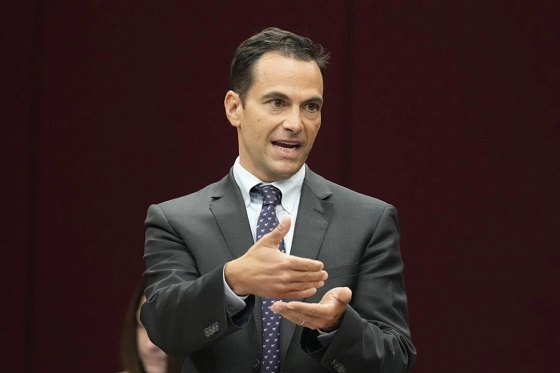Daily Caller
‘It Was Unprecedented’: Retired Border Patrol Chief Blows Whistle On How Biden Admin Hid Migrant Crisis

From the Daily Caller News Foundation
“There was a gag order put on us literally within minutes of the Biden administration taking office”
Retired Border Patrol chief Rodney Scott blew the whistle to the Daily Caller News Foundation on how the Biden-Harris administration allegedly went to great lengths to hide the immigration crisis from the public, just days after a sector chief made similar claims.
Aaron Heitke, a former chief patrol agent for the Border Patrol’s San Diego Sector, testified before a House committee on Sept. 18 and claimed that the White House ordered agents to hide information on arrests of special interest aliens (SIAs), move masses of illegal migrants out of sight of the press and give other instructions to disguise the true level of the border crisis. Scott, who led Border Patrol from roughly the last year of the Trump administration to the first seven months of the Biden administration, told the DCNF he was given similar orders.
“There was a gag order put on us literally within minutes of the Biden administration taking office,” Scott told the DCNF.
“The chief of staff for Customs and Border Protection, when she arrived, one of her first orders was to forbid us from talking to the public, or doing press releases, or doing media without the White House clearing our statements,” Scott continued. “Not only were they not cleared, when they finally did give us talking points, they weren’t even accurate. They weren’t truthful.”
Scott’s tenure as Border Patrol leader overlapped with Vice President Kamala Harris’ assignment to address the root causes of illegal immigration from Central America. The retired chief confirmed to the DCNF that Harris never once spoke to him, even after her designation as “border czar.”
Having worked in Border Patrol since the early 1990s, Scott has experienced multiple changes in the administration. The longtime officer said higher-ups clamping down on communication to the public was nothing new, but the sheer level of control handed down by the Biden-Harris administration was nothing he had experienced before.
“No press conferences were approved, all border tours were shut down,” Scott said. “It was unprecedented. I’ve never seen a gag order that tight.”
Scott’s comments to the DCNF follow the testimony given by Heitke, where the former San Diego sector chief agent said he was prohibited from talking about the rising number of SIAs — migrants who potentially pose a national security risk to the U.S. — unlawfully crossing the border.
“Prior to this administration, the San Diego sector averaged 10–15 SIAs per year,” Heitke told the House Homeland Committee. “Once word was out that the border was far easier to cross, San Diego went to over 100 SIAs in 2022, way over 100 SIAs in 2023 and more than that this year.”
“These are only the ones we caught. At the time, I was told I could not release any information on this increase in SIAs or mention any of the arrests,” he continued. “The administration was trying to convince the public that there was no threat at the border.”
Heitke also went into detail about the alleged steps the Biden-Harris administration would take to hide masses of migrants from reporters, accusing the White House of portraying “fiction” to the public.
“Each time we asked for help in dealing with a new issue, it fell on deaf ears,” Heitke said. “At times in San Diego, we had 2,000 or more aliens sitting in between the fences asking to turn themselves in. I was told to move them out of sight of the media.”
This is not the first time agents have accused the Biden-Harris administration of intentionally trying to cover up the extent of the border crisis from the media. Ahead of Harris’ first trip to the border in El Paso, Texas, in 2021, administration officials gave explicit instructions to clear the area of migrants in order to put on a “show” for the vice president, according to Border Patrol sources who spoke to the New York Post.
While an executive order issued by President Joe Biden in June led to a steady decline in illegal crossings along the U.S.-Mexico border in recent months, his administration had overseen a major wave of illegal immigration into the country after issuing a slate of executive orders that largely dismantled the Trump administration’s border agenda.
Border Patrol agents have encountered more than seven million migrants illegally crossing into the U.S. since the beginning of the Biden-Harris administration, according to the latest data from Customs and Border Protection (CBP). The massive wave of illegal migration has strained the resources of major sanctuary cities such as New York City and Chicago, but also smaller towns in the country’s heartland such as Springfield, Ohio.
Scott commended his former colleague for speaking out, noting that doing so puts his ability to make an income at risk. Many retired agents don’t speak out because companies and other private contractors that work with the federal government want to avoid the publicity that can come with working with or hiring whistleblowers, according to the retired Border Patrol chief.
“I think it’s very problematic that the administration is trying to hide so much relevant information from the public,” Scott said. “I’m very, very grateful that Chief Heitke stepped up and decided to share that information with the public because that really hurts his ability to get contract jobs in the future.”
“[Heitke is] not only taking a risk, he’s knowingly cutting his family’s income by standing up for what’s right,” he continued.
The Department of Homeland Security and the White House did not respond to a request for comment from the DCNF.
Artificial Intelligence
AI Faces Energy Problem With Only One Solution, Oil and Gas


From the Daily Caller News Foundation
Which came first, the chicken or the egg? It’s one of the grand conundrums of history, and it is one that is impacting the rapidly expanding AI datacenter industry related to feeding its voracious electricity needs.
Which comes first, the datacenters or the electricity required to make them go? Without the power, nothing works. It must exist first, or the datacenter won’t go. Without the datacenter, the AI tech doesn’t go, either.
Logic would dictate that datacenter developers who plan to source their power needs with proprietary generation would build it first, before the datacenter is completed. But logic is never simple when billions in capital investment is at risk, along with the need to generate profits as quickly as possible.
Dear Readers:
As a nonprofit, we are dependent on the generosity of our readers.
Please consider making a small donation of any amount here.
Thank you!
Building a power plant is a multi-year project, which itself involves heavy capital investment, and few developers have years to wait. The competition with China to win the race to become the global standard setters in the AI realm is happening now, not in 2027, when a new natural gas plant might be ready to go, or in 2035, the soonest you can reasonably hope to have a new nuclear plant in operation.
Some developers still virtue signal about wind and solar, but the industry’s 99.999% uptime requirement renders them impractical for this role. Besides, with the IRA subsidies on their way out, the economics no longer work.
So, if the datacenter is the chicken in this analogy and the electricity is the egg, real-world considerations dictate that, in most cases, the chicken must come first. That currently leaves many datacenter developers little choice but to force their big demand loads onto the local grid, often straining available capacity and causing utility rates to rise for all customers in the process.
This reality created a ready-made political issue that was exploited by Democrats in the recent Virginia and New Jersey elections, as they laid all the blame on their party’s favorite bogeyman, President Donald Trump. Never mind that this dynamic began long before Jan. 20, when Joe Biden’s autopen was still in charge: This isn’t about the pesky details, but about politics.
In New Jersey, Democrat winner Mikie Sherrill exploited the demonization tactic, telling voters she plans to declare a state of emergency on utility costs and freeze consumers’ utility rates upon being sworn into office. What happens after that wasn’t specified, but it made a good siren song to voters struggling to pay their utility bills each month while still making ends meet.
In her Virginia campaign, Democrat gubernatorial winner Abigail Spanberger attracted votes with a promise to force datacenter developers to “pay their own way and their fair share” of the rising costs of electricity in her state. How she would make that happen is anyone’s guess and really didn’t matter: It was the tactic that counted, and big tech makes for almost as good a bogeyman as Trump or oil companies.
For the Big Tech developers, this is one of the reputational prices they must pay for putting the chicken before the egg. On the positive side, though, this reality is creating big opportunity in other states like Texas. There, big oil companies Chevron and ExxonMobil are both in talks with hyperscalers to help meet their electricity needs.
Chevron has plans to build a massive power generation facility that would exploit its own Permian Basin natural gas production to provide as much as 2.5 gigawatts of power to regional datacenters. CEO Mike Wirth says his team expects to make a final investment decision early next year with a target to have the first plant up and running by the end of 2027.
ExxonMobil CEO Darren Woods recently detailed his company’s plans to leverage its expertise in the realm of carbon capture and storage to help developers lower their emissions profiles when sourcing their needs via natural gas generation.
“We secured locations. We’ve got the existing infrastructure, certainly have the know-how in terms of the technology of capturing, transporting and storing [carbon dioxide],” Woods told investors.
It’s an opportunity-rich environment in which companies must strive to find ways to put the eggs before the chickens before ambitious politicians insert themselves into the process. As the recent elections showed, the time remaining to get that done is growing short.
David Blackmon is an energy writer and consultant based in Texas. He spent 40 years in the oil and gas business, where he specialized in public policy and communications.
Business
Will Paramount turn the tide of legacy media and entertainment?


From the Daily Caller News Foundation
The recent leadership changes at Paramount Skydance suggest that the company may finally be ready to correct course after years of ideological drift, cultural activism posing as programming, and a pattern of self-inflicted financial and reputational damage.
Nowhere was this problem more visible than at CBS News, which for years operated as one of the most partisan and combative news organizations. Let’s be honest, CBS was the worst of an already left biased industry that stopped at nothing to censor conservatives. The network seemed committed to the idea that its viewers needed to be guided, corrected, or morally shaped by its editorial decisions.
This culminated in the CBS and 60 Minutes segment with Kamala Harris that was so heavily manipulated and so structurally misleading that it triggered widespread backlash and ultimately forced Paramount to settle a $16 million dispute with Donald Trump. That was not merely a legal or contractual problem. It was an institutional failure that demonstrated the degree to which political advocacy had overtaken journalistic integrity.
Dear Readers:
As a nonprofit, we are dependent on the generosity of our readers.
Please consider making a small donation of any amount here.
Thank you!
For many longtime viewers across the political spectrum, that episode represented a clear breaking point. It became impossible to argue that CBS News was simply leaning left. It was operating with a mission orientation that prioritized shaping narratives rather than reporting truth. As a result, trust collapsed. Many of us who once had long-term professional, commercial, or intellectual ties to Paramount and CBS walked away.
David Ellison’s acquisition of Paramount marks the most consequential change to the studio’s identity in a generation. Ellison is not anchored to the old Hollywood ecosystem where cultural signaling and activist messaging were considered more important than story, audience appeal, or shareholder value.
His professional history in film and strategic business management suggests an approach grounded in commercial performance, audience trust, and brand rebuilding rather than ideological identity. That shift matters because Paramount has spent years creating content and news coverage that seemed designed to provoke or instruct viewers rather than entertain or inform them. It was an approach that drained goodwill, eroded market share, and drove entire segments of the viewing public elsewhere.
The appointment of Bari Weiss as the new chief editor of CBS News is so significant. Weiss has built her reputation on rejecting ideological conformity imposed from either side. She has consistently spoken out against antisemitism and the moral disorientation that emerges when institutions prioritize political messaging over honesty.
Her brand centers on the belief that journalism should clarify rather than obscure. During President Trump’s recent 60 Minutes interview, he praised Weiss as a “great person” and credited her with helping restore integrity and editorial seriousness inside CBS. That moment signaled something important. Paramount is no longer simply rearranging executives. It is rethinking identity.
The appointment of Makan Delrahim as Chief Legal Officer was an early indicator. Delrahim’s background at the Department of Justice, where he led antitrust enforcement, signals seriousness about governance, compliance, and restoring institutional discipline.
But the deeper and more meaningful shift is occurring at the ownership and editorial levels, where the most politically charged parts of Paramount’s portfolio may finally be shedding the habits that alienated millions of viewers.The transformation will not be immediate. Institutions develop habits, internal cultures, and incentive structures that resist correction. There will be internal opposition, particularly from staff and producers who benefited from the ideological culture that defined CBS News in recent years.
There will be critics in Hollywood who see any shift toward balance as a threat to their influence. And there will be outside voices who will insist that any move away from their preferred political posture is regression.
But genuine reform never begins with instant consensus. It begins with leadership willing to be clear about the mission.
Paramount has the opportunity to reclaim what once made it extraordinary. Not as a symbol. Not as a message distribution vehicle. But as a studio that understands that good storytelling and credible reporting are not partisan aims. They are universal aims. Entertainment succeeds when it connects with audiences rather than instructing them. Journalism succeeds when it pursues truth rather than victory.
In an era when audiences have more viewing choices than at any time in history, trust is an economic asset. Viewers are sophisticated. They recognize when they are being lectured rather than engaged. They know when editorial goals are political rather than informational. And they are willing to reward any institution that treats them with respect.
There is now reason to believe Paramount understands this. The leadership is changing. The tone is changing. The incentives are being reassessed.
It is not the final outcome. But it is a real beginning. As the great Winston Churchill once said; “Now this is not the end. It is not even the beginning of the end. But it is, perhaps, the end of the beginning”.
For the first time in a long time, the door to cultural realignment in legacy media is open. And Paramount is standing at the threshold and has the capability to become a market leader once again. If Paramount acts, the industry will follow.
Bill Flaig and Tom Carter are the Co-Founders of The American Conservatives Values ETF, Ticker Symbol ACVF traded on the New York Stock Exchange. Ticker Symbol ACVF
Learn more at www.InvestConservative.com
-

 Energy23 hours ago
Energy23 hours agoIt should not take a crisis for Canada to develop the resources that make people and communities thrive.
-

 Fraser Institute2 days ago
Fraser Institute2 days agoCourts and governments caused B.C.’s property crisis—they’re not about to fix it
-

 Alberta1 day ago
Alberta1 day agoFederal budget: It’s not easy being green
-

 Alberta2 days ago
Alberta2 days agoChatGPT may explain why gap between report card grades and standardized test scores is getting bigger
-

 Education2 days ago
Education2 days agoJohns Hopkins University Announces Free Tuition For Most Students
-

 Business1 day ago
Business1 day agoWill Paramount turn the tide of legacy media and entertainment?
-

 Business2 days ago
Business2 days agoParliamentary Budget Officer begs Carney to cut back on spending
-

 Energy1 day ago
Energy1 day agoA picture is worth a thousand spreadsheets




